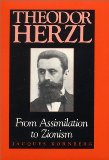What drove Herzl to Zionism?
[Herzl's] "alienation from his own Jewishness and his deep underlying desire to be a Gentile himself. Kornberg shows how Herzl really wanted to be accepted as a white Christian man and how he came, because of this alienation, to think that those who stood in his way were the exilic Jews, or the unmodernised Jews. He was thinking of ways in which he could "normalise" the Jews so they wouldn't stand in his way of becoming a proper white man."

Q: Theodor Herzl is widely regarded as the father of modern political Zionism. Although there was Jewish settlement in Palestine before he wrote his seminal work Der Judenstaat (The Jewish State) in 1895, he is credited with transforming Zionism into a coherent national political movement. Why did you choose Kornberg's biography of him?
A: I think this is the best biography of Herzl I have seen. The first reason that it's so good is that it is based on meticulous research and it also unearths documents, letters and diary entries that were either unseen by others or seen but not commented upon or their significance not illuminated. Secondly, I think that this book shows a remarkably deep understanding of Herzl's personality. It's not a psycho-biography, but it's the best understanding of his emotional, mental, intellectual and political make up, which is accompanied by a subtle awareness of the historical context.
Q: Can you tell us about Theodor Herzl?
A: Herzl was a Hungarian Jew born in 1864 in Budapest to wealthy parents who were not completely alienated from Judaism nor completely assimilated. One could call them secular, bourgeois Jews with an attachment to Judaism. They moved to Vienna, the centre of the Austro-Hungarian Empire, when Herzl was just finishing high school. After school Herzl enrolled at the university to study law. He also joined fraternities while he was there, the most significant of which, Alba, was extremely right-wing German nationalist, and anti-Semitic. He was also obsessed in this period with duelling, something which Kornberg analyses with much insight in his book, and which was palpable in Herzl's conversion to Zionism.
Herzl was not really a successful or active lawyer. His ambition was to become a literary figure whose plays would be performed in Vienna's most famous theatre and in the wider German-speaking world. He also wanted to write novels that would bring him fame and status. He eventually became a journalist, where he was more successful, because as a playwright or as a literary writer in general he was not that successful at the time.
As a journalist, he was a correspondent for the very prestigious Neue Freie Presse and became its correspondent in Paris, where in 1894-1897 his conversion to Zionism occurred. That's when he wrote many of the texts for which he became famous and, of course, from there he proceeded to establish the World Zionist Organisation and really transformed it into an organisation with clear political aims and global ambitions. He died relatively young, aged 44, in 1904.
What makes Kornberg's biography so special and what conclusions does he draw?
A: Kornberg refutes thoroughly the view of Herzl as someone who offered a progressive universal vision of the liberation of the Jews. He puts much more emphasis on the arrival of Herzl to Zionism through the rejection of the possibility of the Jews participating in the betterment of European society so that it would include them, and through alienation from his own Jewishness and his deep underlying desire to be a Gentile himself. Kornberg shows how Herzl really wanted to be accepted as a white Christian man and how he came, because of this alienation, to think that those who stood in his way were the exilic Jews, or the unmodernised Jews. He was thinking of ways in which he could "normalise" the Jews so they wouldn't stand in his way of becoming a proper white man. I think this is a very interesting underlying thesis, which he supports with ample documentation. The book is really structured around a series of answers that Herzl was looking for, to apply to the Jews so they would normalise. Zionism was only the last of a series of attempts that went from conversion to Christianity, to socialism and ultimately to Zionism.
What Kornberg also shows is how Herzl understood the so-called Jewish problem very much in the same way as anti-Semites, by accepting that there was something wrong with the Jews and they were uncorrectable as long as they stayed within Europe as an exiled nation. And therefore, he concluded, they had to leave Europe and create their own colony in the east, which would normalise them. Along the way, Kornberg makes some specific discoveries, which were a revelation to me. Through very meticulous philological research, he puts to rest the myth that Herzl's metamorphosis occurred as a result of witnessing the Dreyfus affair in Paris. With marvellous research, he shows that this could not have been the case. What Herzl did as a shrewd politician was to retrospectively concoct the story that he converted to Zionism while witnessing the humiliation of the Jewish officer Dreyfus. This became conventional wisdom but it is not factually and empirically true.
Origianl piece in The Browser
